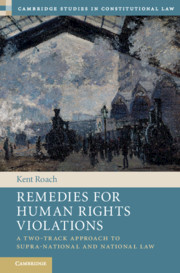Book contents
- Remedies for Human Rights Violations
- Cambridge Studies in Constitutional Law
- Remedies for Human Rights Violations
- Copyright page
- Brief Contents
- Contents
- Acknowledgements
- Table of Cases
- 1 The Importance and Complexity of Remedies
- 2 A Two-Track Approach to Individual and Systemic Remedies
- 3 Interim Remedies
- 4 Remedies for Laws That Violate Human Rights
- 5 Damages
- 6 Remedies in the Criminal Process
- 7 Declarations, Injunctions and the Declaration Plus
- 8 Remedies for Social, Economic and Cultural Rights
- 9 Remedies for Violations of Indigenous Rights
- 10 Conclusion
- Select Bibliography
- Index
10 - Conclusion
Published online by Cambridge University Press: 29 March 2021
- Remedies for Human Rights Violations
- Cambridge Studies in Constitutional Law
- Remedies for Human Rights Violations
- Copyright page
- Brief Contents
- Contents
- Acknowledgements
- Table of Cases
- 1 The Importance and Complexity of Remedies
- 2 A Two-Track Approach to Individual and Systemic Remedies
- 3 Interim Remedies
- 4 Remedies for Laws That Violate Human Rights
- 5 Damages
- 6 Remedies in the Criminal Process
- 7 Declarations, Injunctions and the Declaration Plus
- 8 Remedies for Social, Economic and Cultural Rights
- 9 Remedies for Violations of Indigenous Rights
- 10 Conclusion
- Select Bibliography
- Index
Summary
This Chapter outlines four methodological and four substantive contributions of the book. By addressing the frequent neglect of remedies in human rights law, the book brings human rights closer to the reality of their frequent violation, especially for less advantaged people. It also examines the inter-relations and cross-fertilization of remedies in domestic and international law. It reveals remedies as a fruitful site for comparative law. This includes American remedial exceptionalism and differences between regional supra-national human rights courts. This Chapter highlights the book’s development of an overarching conceptual structure for remedies. Substantively, the book argues that familiar proportionality principles can improve remedial decision-making and make it more transparent. It also outlines similarities between South African engagement orders and the duty to consult Indigenous peoples. In both cases, engagement can result in consensual agreements, but also can limit rights. The two-track approach recognizes that remedies should compensate for past harms and prevent immediate irreparable harms, but also that they should prevent repetitive violations in the future. Individual remedies can recognize remedial failure and start another cycle of two-track individual and systemic remedies.
Keywords
- Type
- Chapter
- Information
- Remedies for Human Rights ViolationsA Two-Track Approach to Supra-national and National Law, pp. 516 - 533Publisher: Cambridge University PressPrint publication year: 2021



